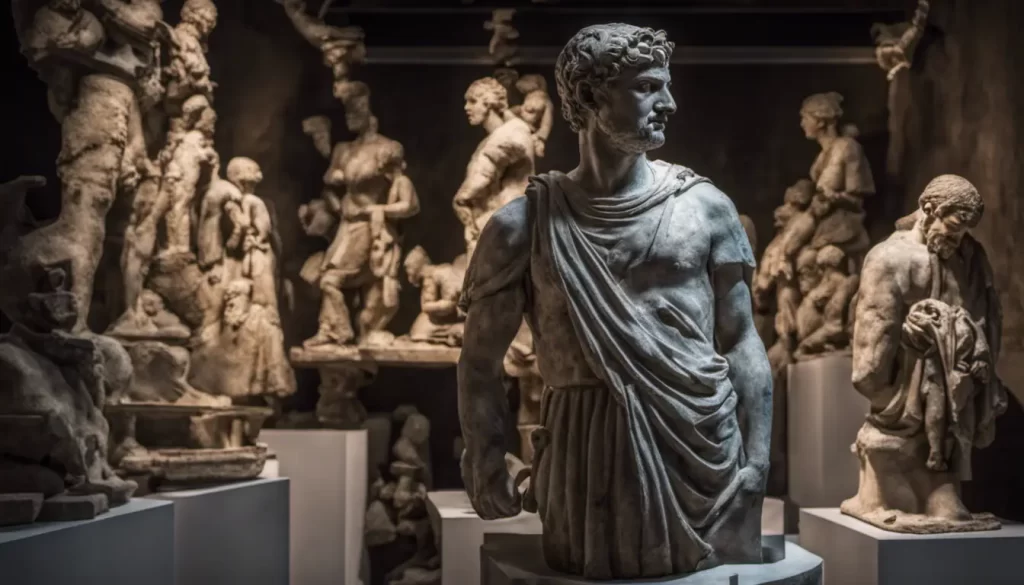History of Stoicism
Stoicism is a practical philosophy that teaches us to focus on what we can control and accept what we cannot. It’s all about developing resilience, wisdom, and inner peace.
What is Stoicism?
Stoicism, a philosophical school established in Athens in the early 3rd century B.C., presents a unique worldview centered on personal ethics grounded in logical reasoning and the law of cause and effect. According to this philosophy, the universe follows a rational and understandable structure, even when its intricacies elude human understanding.
The ancient Stoics believed that, while we lack control over external events, we retain authority over our own thoughts and perceptions.
Therefore, under their teachings, individuals should nurture disciplined, self-controlled, and tolerant dispositions, employing courage and reason as guiding principles. One can attain a virtuous harmony by embracing this path, considered the sole route to genuine happiness.
The History, Origin, and Etymology of Stoicism
Stoicism, one of the prominent philosophical schools of Ancient Greece, had its inception in Athens during the 3rd century BC, under the guidance of Zeno of Citium (336-264 BC), a philosopher hailing from Phoenician origins, who was widely referred to as “the Stoic” during his time. Among his notable disciples, Cleantes of Aso (330-232 BC) succeeded him, and Chrysippus of Solos (281-208 BC), a student of Cleantes, played a significant role in shaping the Stoic tradition.
Originally known as “Zenonism”, the Stoic movement, also called “Stoikos” (Στωϊκός), derives its name from the “Stoa Poikile” or the “painted portico” (in ancient Greek, ἡ ποικίλη στοά). This remarkable entrance, adorned with mythical and historical battle depictions, stood east of the Athens Agora. It was within these grand surroundings that Zeno and his disciples convened, earning them the moniker “Stoics”.
Stoicism enjoyed significant success in ancient Greece, progressing through three distinct phases: the old, middle, and new. Following its origins in Athens, it extended its influence to various Mediterranean regions, particularly within the Roman Republic. This led to the emergence of Roman Stoicism, championed by notable figures like Panaetius, Posidonius, Seneca, Epictetus, and Marcus Aurelius. These Roman Stoics gained even greater renown than their Greek predecessors, and a wealth of Roman Stoic works has survived through the ages, surpassing the quantity of Greek Stoic writings.
In the 16th century, Stoicism experienced a revival, merging with aspects of Christianity to form what is known as neo-Stoicism. The founder of this movement was the Belgian humanist Justus Lipsius (1547-1606). In 1584, he published his most renowned work, “De Constantia”, which laid the foundation for the resurgence of Stoicism.
Classical and Christian Stoicism left an indelible mark on the philosophies of several influential modern thinkers, notably Immanuel Kant, Gottfried Leibniz, Baruch Spinoza, Adam Smith, and even Jean-Jacques Rousseau. The enduring influence of Stoicism can be discerned in their works and philosophical contributions.

Principles of Stoic Philosophy
- Virtue as the Supreme Good: The central axiom of Stoicism asserts that “virtue is the highest good” or “virtue is the sole good.” This philosophy maintains that individuals should aspire to cultivate inner virtue, recognizing that external factors like wealth, success, health, or pleasure hold no intrinsic moral value. According to the Stoics, true importance lies in wisdom, which they consider to be the foundational basis for all that is good. They equate happiness, knowledge, and virtue as the same. In essence, whether used wisely or misused, goods must be unconditionally good, with virtue, understood as wisdom, being the sole unconditional good.
- Calm, Self-Control, and Discipline: The Stoic mindset is one of tranquility, self-control, and discipline, whether confronting adversity or abundance. It is this disposition of equanimity that leads to freedom and inner peace. The Stoics sought to attain a state of imperturbability, known as ataraxia, as their ultimate goal.
- Imitating the Equilibrium of the Universe: Stoics advocated for individuals to mirror the equilibrium of the cosmos by aligning with their inner nature rather than being swayed by worldly distractions. They believed that specific errors in judgment (particularly errors in thought) could give rise to harmful emotions. Thus, Stoicism encourages maintaining one’s will in harmony with the natural order, accepting reality as it is, and relinquishing desires, fears, and ambitions.
- Universal Brotherhood: According to Stoic philosophy, the measure of human nature is not merely in words but in actions. Consequently, all individuals are deemed equal members of the same global family, citizens worldwide. Stoicism promotes a deeply cosmopolitan perspective, emphasizing the interconnectedness of all.
- Causality over Luck: Stoicism dismisses the notions of luck and chance in favor of a belief in causality. It posits that every event is a consequence of something else, even if the cause is not readily apparent or comprehensible. Stoics maintain that events are governed by underlying causes, advocating for a worldview rooted in rationality and causation rather than randomness or luck.
The Four Cardinal Virtues of Stoicism
Stoicism venerates the following as the four cardinal virtues:
- Wisdom in Action: The ability to apply practical knowledge effectively, allowing one to confront challenging situations with a composed and clear mind.
- Moderation and Self-Control: The practice of temperance, which enables individuals to temper and govern their desires for daily pleasures, preventing excessive indulgence.
- Justice in All Actions: Stoics uphold the principle of justice, emphasizing the necessity of upholding fairness even when confronted with injustice from others.
- Courage in Every Facet of Life: Courage is both the fortitude to face extreme circumstances and the resilience to maintain clarity and integrity in everyday life, embodying the Stoic spirit.
Stoic Ethics
- Understanding the Inner Irrationality of Behavior: Stoic philosophy grappled with elucidating the internal irrationality often inherent in human actions.
- Addressing the Impact of Character Development and Education: They examined the challenges arising from the absence of character education, focusing on the importance of cultivating virtuous dispositions.
- Virtue, Personal Growth, and Individual Accountability: Stoicism was deeply concerned with questions of integrity, moral advancement, and individual responsibility.
- Discerning Righteous Acts According to Strict Morality: Stoic ethics contemplated what constitutes due and truly righteous behavior in strictly moral terms.
- Pursuit of Happiness as the Ultimate Goal: Central to Stoic thought was the pursuit of happiness, regarded as the ultimate aim of human existence.
- Emotional States and Their Impact on Actions: Stoics explored the relationship between emotional states and the consequences of engaging in specific courses of action while under the influence of those emotions.
- The Role of Emotional States in a Fulfilling Life: Finally, they pondered the place of emotional states within the framework of a virtuous and fulfilling life, among other ethical quandaries.

Prominent Figures of Stoicism
The influence of several noteworthy individuals marked stoicism in antiquity:
Zeno of Citium (336-264 BC): The founding figure of Stoicism, Zeno was born in Citium, Cyprus. Initially drawn to Cynicism, he later developed the foundational principles of the Stoic school. Regrettably, his original works have been lost to time, leaving behind only fragmented pieces and references found in the writings of others.
Cleantes of Aso (330-232 BC): Cleantes, the chief disciple of Zeno, succeeded his master as the head of the Stoic school. Despite his humble beginnings, he eventually joined the philosophical community at the Stoa Poikile, as the Stoic school was known. Cleantes continued to lead the school until his remarkable lifespan ended at 99.
Chrysippus of Solos (281-208 BC): Regarded as the “second founder” of Greek Stoicism, Chrysippus played a pivotal role in the development of Stoic philosophy. He was not only a disciple of Cleantes but is also noted as a significant figure in the realm of Greek grammar during antiquity. Chrysippus is said to have attended the Platonic Academy as well.
Seneca the Younger (4 BC-65 AD): A philosopher, politician, and prolific writer, Seneca held a prominent position in Roman politics during the reigns of Claudius and Nero. He emerged as a leading exponent of Roman Stoicism, and his works serve as a primary source of knowledge on Stoic doctrine that has endured through the ages. Seneca’s influence extended to later thinkers, including those in Christian and Renaissance traditions, alongside figures like Epictetus and Marcus Aurelius.
Epictetus (55-135 AD): A Greek philosopher affiliated with the Stoic school, Epictetus spent much of his life in Rome as a slave. He later founded his school in Nicopolis. Unlike his predecessors, Epictetus left no written works. Still, his philosophical ideas were preserved through the writings of his disciple, Flavius Arrianus, and his teachings were heavily influenced by the philosophies of Socrates.
What Does It Mean to Be Stoic in Today's Context?
In contemporary language, the terms “stoic” or “stoicism” have come to represent qualities such as calmness and a composed demeanor—essentially, an attitude characterized by self-control and resilience in the face of human emotions.
When we describe someone as reacting to bad news “with stoicism,” we imply that they exhibited inner strength and faced the situation with fortitude without succumbing to emotional distress. This interpretation can apply to moments of joy, tension, or human emotions.
For instance, if we envision someone winning the lottery and calmly sharing the news, we might say they did so “with absolute stoicism.” Similarly, individuals who find themselves making significant decisions and manage to do so with courage and rationality, free from the sway of their emotions, can be viewed as displaying stoic qualities.

Examples of Stoicism in Everyday Life
Here are some instances of daily life events approached with Stoic principles:
Navigating a Heartbreak Stoically: When faced with a love breakup and adopting a Stoic mindset, it doesn’t imply that one won’t experience pain or suffering. Instead, it means confronting these emotions rationally and avoiding impulsive reactions, often driven by intense emotions and distress.
Celebrating Victory with Stoicism: Winning a coveted prize while being Stoic doesn’t suggest suppressing joy entirely. Instead, it involves acknowledging the transient nature of this feeling and refraining from allowing it to dictate hasty decisions or actions. Maintaining a clear and rational perspective is paramount, even in moments of joy. The Stoic individual will undoubtedly revel in their victory but won’t let it lead to imprudent or irrational behavior.
Exercising Moderation in Festivities: Participating in a feast is an exercise in profound moderation for a Stoic. Pleasures and desires are deemed valuable only when they contribute to transcendent virtue; anything else distracts from the Stoic path. Therefore, a Stoic will savor only what aligns with moral principles without indulging excessively or losing control.
Stoicism, Epicureanism, and Skepticism
It’s essential to distinguish Stoicism, a philosophy centered on rational moderation and ataraxia (tranquility of mind), from other philosophical currents like Epicureanism and Skepticism.
Epicureanism: This ancient Greek philosophy, like Stoicism, falls under the hedonistic category, emphasizing the pursuit of pleasure as the ultimate good. However, Epicureanism, founded by Epicurus of Samos around 307 BC, deviates from traditional hedonism. It advocates seeking fun through a state akin to Stoic ataraxia: the absence of pain, fear, and physical discomfort (aponia).
This state is achieved through modest and sustainable pleasures, simple living, and a deep understanding of the natural world. Epicureanism was a rival to both Platonism and later Stoicism and continued to exist until the 3rd century AD.
Skepticism: This philosophical school, rooted in Greek antiquity and founded by the philosopher Pyrrhon (365-275 BC), asserts the impossibility of knowing the ultimate truth or even the existence of a knowable truth.
Its fundamental tenet was that a philosopher should refrain from making assertions and instead offer opinions since, at its core, certainty about anything was deemed unattainable. Doubt and the suspension of judgment (epoché) form the foundational principles of Skepticism.
